|
“Let the word of Christ dwell in you richly, as in all wisdom you teach and admonish one another, singing psalms, hymns, and spiritual songs with gratitude in your hearts to God.” –Colossians 3:16
How do you get to know Jesus the person? How do you get to know God? The Holy Spirit? As Catholics, we are called into an intimate relationship with Christ. Jesus wants for us to know him, and so he left us with the gift of the Eucharist so that we would never be without his physical presence. God can reach us in the silence of his presence. Even so, sometimes it is hard to know what God is saying to us, and it can be difficult to interpret God’s will for our lives. One way of building an intimate relationship with God and interpreting his will is by letting the word of Christ dwell richly within us (cf. Col. 3:16). It is in Scripture that we can get to know Jesus the person: his thoughts, his stories, and his deep love for us. The Bible is important because it is where we can study God, get to know him, and understand his will for our lives. He has left us with words of instruction, comfort, welcome, prayer, and love. Knowing the words of God, his Son, his prophets, and his saints can guide us through life’s joys, trials, and periods of stillness. In the Word of God, we can hear God speaking to us in ways that answer our prayers and help prepare us to be apostles. St. Paul told Timothy that knowing Scripture was essential for living a life of faith: “From infancy you have known [the] sacred scriptures, which are capable of giving you wisdom for salvation through faith in Christ Jesus. All scripture is inspired by God and is useful for teaching, for refutation, for correction, and for training in righteousness, so that one who belongs to God may be competent, equipped for every good work.” -2 Timothy 3:15-17 By “letting the word of Christ dwell in [us] richly,” we can better know Jesus and become more fully “equipped for every good work.” I think about this and my relationship with Christ, and I realize that Christ knows me better than I know him. I lament to him unceasingly, but I don’t always run to Scripture. As I have been taking the time to study God and his Word, I find that my trust in the Lord has strengthened, and I see his love more fully. When I find Scripture that speaks to me and I cling to it – whether it’s through memorization and praying it to myself, setting a verse as my phone background, or making it visible in my apartment – I am filled with patience and peace because I know I have the Word of God and his Spirit with me. I want to challenge you to get to know Jesus better through Scripture. I once witnessed a talk where the speaker reminded us that the Spirit of God speaks to us in the four Gospels (Matthew, Mark, Luke, and John). In addition to prayer, the sacraments, or Christian community, Scripture is where Christ himself reaches out to us. If we took just five minutes a day to read from a Gospel, that would be over 30 hours of quality time with Jesus in a year. We could read 10 minutes a day, and that would be over 60 hours with Jesus in a year! Even by starting with baby steps, we can build a relationship and truly call Christ our friend. Jesus himself tells a parable of a sower planting seeds, where he explains “the seed is the word of God” (Luke 8:11). For the seed that fell within rich soil, “it produced fruit a hundredfold” (Luke 8:8) and they “are the ones who, when they have heard the word, embrace it with a generous and good heart, and bear fruit through perseverance” (Luke 8:15). May your heart be open and receptive to the Word of God so that it may bear much fruit in you and in the world! In Scripture, Jesus says: “And I tell you, ask and you will receive; seek and you will find; knock and the door will be opened to you” (Luke 11:9). Today, I am asking Jesus to let me know him better through his Word as I commit to five minutes of Scripture reading a day. It will require me to be vulnerable and take action, but in doing so, I open myself to the transforming love of Christ that enables us to become better apostles. If you are not sure where to start, there are many great resources for reading the Church’s daily readings or the Divine Office, which is the Church’s daily prayer comprised of Scripture. When all else fails, just open your Bible and start reading! You can even start by reading the Parable of the Sower in Luke 8:4-15! I pray that God will give you the grace to know his Son through Scripture. May your reading of Scripture lead to a deepened friendship with Christ, creating fruitful soil that bears much fruit! For more resources on Prayer and Catechesis, or to read the Daily Mass Readings, please click here. Alyce Shields is a teacher in Washington D.C.
0 Comments
August 27th marks the feast of St. Monica, mother of St. Augustine of Hippo. St. Monica spent seventeen years praying for the conversion of her son, whose reputation for hedonism and religious skepticism preceded him. St. Monica is said to have wept for her son Augustine every night. Her devotion to him is an example of what it means to love unconditionally, even when it hurts. As a new mother, I have spent many hours reflecting on the mystery of unconditional love and have recorded some of my thoughts below. Let us turn to St. Monica when our hearts are weak and we need help loving as God calls us to love. St. Monica, pray for us. “This is my body, which will be given for you” (Luke 22:19). Christ’s words at the Last Supper never fully resonated with me until I became a mother. From the moment of her conception, I gave up my body to my daughter. Baby books, friends, and other women warned me of the physical tolls of pregnancy--the aches and pains, the nausea, the swollen feet, the labor--but I was unprepared for the physical sacrifices afterward. My body is not my own. It is at service to a squirmy, snorty, sweaty being who doesn’t even realize how needy she is. And yet, this physical sacrifice is good and necessary. It has helped me to remember that God wants all of us. Not just our souls and intellects, but our bodies too. I am an intellectual person by nature and often use my love of study to learn about God. But learning about God and knowing God are not the same thing. Just like reading about how to ride a bike and actually climbing up on the seat are not the same. It is easy for me to pick up another historical commentary on the gospels and feel like I am improving my relationship with God. It’s hard to deny myself a second cup of coffee. It’s hard to place my phone in another room and walk away. It’s hard to lower myself onto my knees to pray, or even to sustain prayer for longer than a minute. These bodily actions are hard because they require sacrifice. And yet, I suspect the sacrifices I make for God are more important to him than whether I know if Jesus was born in cave or a wooden stable. Motherhood, too, is a bodily commitment and one that can be difficult to embrace with joy. I sacrifice my body in a small way every time I stop what I am doing to nurse my baby, or to get down on my knees and engage her in yet another game of “rub the belly, rub the belly”. Yet, as I commit to these physical tasks, I hope I also die to self a little more each day. With each physical act, with each twinge between the shoulder blades, I remind myself, that--in a much bigger way--this is what Jesus did for me on the cross. Ironically, it actually was a book that helped me to understand the beauty of bodily sacrifice. No, it wasn’t the Bible, or Pope Francis’ Amoris Laetitia, it was The Giving Tree, by Shel Silverstein. The gist of the story is that a tree continues to give and give to a boy throughout the boy's life to make him happy. First she gives him her apples so the boy can sell them for pocket money, then she gives him her branches so that he can build a house, then her trunk so that he can build a canoe. Eventually the tree is reduced to a stump and the boy hasn’t visited her in years. And yet the refrain after each gift is, “And the tree was happy.” By the end of the book, my husband found me lying on my back crying while my daughter kicked her feet unconcernedly next to me. Our conversation went as follows: “I told you not to read that book!” “It’s just so stupid! The boy is so ungrateful! The tree gave him everything and he never even said thank you. She literally let him cut down her trunk for him. It’s not fair.” “Would you do that for Elizabeth?” My answer was immediate. If motherhood has taught me anything, it’s what it means to love unconditionally. And the craziest part is that my bodily sacrifices to Elizabeth don’t even compare to Christ’s sacrifice for me. Truly, to be loved by Christ is a humbling thing. Click here for more resources on Marriage and Family. "The confession of evil works is the first beginning of good works." -St. Augustine I’ll come right out and say it: I dislike going to Confession. I really do. And so I avoid it like the plague. We all have our struggles in faith, and this is my biggest one. “Why do I have to seek out a priest, another human, and tell him all the bad things I’ve done? Can’t I just talk to God directly? Doesn’t God hear everything in your heart?” We’ve all heard these questions—challenges, really—about the need for regular visits to the confessional. After all, God does know everything in our hearts. We can talk to him directly, and we should do so often! But we need more than just that internal dialogue with God. Our faith, after all, isn’t one lived alone. St. Paul tells the Romans, “We, though many, are one body in Christ and individually parts of one another.” (Romans 12:5) I may be a toe, you may be an earlobe, but we all, collectively, make up the one Body of Christ in the Church. So if that’s what we truly believe, and one of those parts gets hurt, the whole rest of the body feels that pain. If you stub your toe, the whole of your body stops everything and focuses on that pain. So, too, when we stub our spiritual toe, we create a ripple throughout the rest of the Body. We could talk at length about the nature and effects of sin, but that’s for another discussion. The point is that each of our sins have an effect, not just on ourselves and on God, but on the whole of the Church, too. And so we have three people or groups to reconcile with when we’ve sinned: ourselves, our Creator, and the larger Body of which we are each a part. And who better to forgive our sins than a priest? He’s a spiritual father, a representative of the Church, and, most importantly, someone who acts “in persona Christi,” or “in the person of Christ.” By virtue of his ordination, each priest has been given some pretty awesome powers. He can baptize people, he can bless places and things, he can call down the power of God onto simple bread and wine, miraculously turning it into Christ’s Body and Blood. So if he can do all those things, can’t he also exercise the power Christ gave the Apostles after his Resurrection? “Whose sins you forgive are forgiven them, and whose sins you retain are retained.” (John 20:23) That’s crazy! But it’s our faith, and it comes from Christ himself. We profess this in the Apostle’s Creed: “I believe…in the forgiveness of sins…” Now we’re all thinking, “Okay, that’s all well and good, but Confession is still too uncomfortable.” And you’re right! It is. That’s why I dislike going. I don’t like being uncomfortable. I don’t like to acknowledge the messy parts of life, including my own failings and shortcomings. I don’t like to admit that I’m wrong, especially when I keep doing the same wrong thing over and over again. But every time I finally buck up the courage (sometimes after months or years) to walk into a confessional, I’m never disappointed. The result is always the same: God has forgiven me and wiped the slate clean. And I feel so good about it! It’s not that I’m afraid of God’s mercy. In fact, I crave it. The problem is that I’m too afraid of my own self, of my own fragile and broken humanity, to even ask for this mercy. In my heart of hearts, I don’t believe I deserve it. And that’s the thing: none of us deserve it. Not one of us can ever be sorry enough, contrite enough, penitent enough, to make amends for what we’ve done and continue to do over and over again. We can never fully make it up to God; that’s why he sent his Son. Jesus took the sins of the whole world on his shoulders, beaten and bloodied though He was, until he became sin itself: “For our sake he made him to be sin who did not know sin, so that we might become the righteousness of God in him.” (2 Corinthians 5:21). He took every sin each of us will ever commit, carried them up on the cross, and died as payment for it. He’s already paid the price for us. It’s like a spiritual gift card that never expires, but we have to use it to take advantage of the gift. That’s why Confession is so important: the mercy is guaranteed; we have but to ask for it. Pope St. John Paul II once said, “Confession is an act of honesty and courage - an act of entrusting ourselves, beyond sin, to the mercy of a loving and forgiving God.” In this Jubilee Year of Mercy, may we all be honest and courageous enough to do that. Whether you just went to Confession last week or, like me, have been putting it off for way too long, be courageous and just go. Let the Year of Mercy have some personal meaning for you, and let God forgive you for what He’s already paid for upfront. For more resources on Confession and the Jubilee Year of Mercy, please click here. One of the most exciting, profound, yet sometimes awkward and unnerving places of parish ministry involves welcoming new Catholics officially into the Church through what is called the Rite of Christian Initiation of Adults, or RCIA for short. Many parishes are now gearing up for the next season of RCIA, which generally runs from early Fall and concludes with the Easter Vigil (this year on April 15, 2017). Over the years, I’ve had the opportunity to serve and lead RCIA in a few parish settings and have been blessed to accompany some friends and family members through the process. But every year there are things I learn and need to be reminded of to facilitate a truly transformative time for the candidates and catechumens. Below, I’d like to offer some perspective, as well as a few pitfalls to avoid that have made a difference in the way the teams I’ve been a part of approach this important ministry. Speak their Language For those of us who grew up Catholic or actively learn and read about our faith, we become very familiar with the vocabulary and theology of the Church that is typically foreign and confusing to newcomers. Don’t assume people know what you are talking about, or what a word or acronym (even RCIA!) means. People are learning a new language of faith, which requires patience, clarity, and practice. Without patience and clarity, people feel alienated and lost, not impressed, and you risk having your faith come off as pretentious and antiquated, not living and effective. Teach Them to Pray Going off the last point, we should remember that prayer is the primary language of the faith. This is based in the ancient Catholic spiritual axiom, “Lex orandi, lex credendi.” The truth is, we assume people know how to pray, but prayer takes learning and practice, just like anything else. Prayer is necessary for living out the Catholic life beyond RCIA, but instead of just telling people to pray, we need to actively teach new Catholics how to pray by praying with them. Do some form of prayer together each week—the Rosary, Lectio Divina, a litany—to expose people to the richness of Catholic spiritual life. If we leave participants with anything, let it be the desire and ability to pray. Learn Their Story As passionate teachers of the faith, RCIA leaders often love to share their experience and favorite subjects about the Church and our faith. That’s important, but we often risk talking when we should simply be listening. Be mindful in giving the candidates and catechumens plenty of time to speak and share their story with one another, not just for a brief minute the first day, but also as part of an ongoing process that extends the whole course. Think Outside the Classroom Learning the content of the Catholic faith is essential, no doubt about it. But often our approach gives the impression that church teachings only live in the pages of textbooks. If all learning about the faith happens in the classroom, it has a tendency to stay there. Look for ways to make connections between Catholic beliefs and tradition and real action and practices. Learn about the corporal and spiritual works of mercy by scheduling time to go out as a team, do a few of them together, and then reflect on them. In Baltimore where I live and work, we are surrounded by some amazing Catholic historical and religious sites. We decided, “Why not incorporate that into our RCIA experience?” Instead of just reading about the saints, we planned field trips to the churches and homes of local saints. RCIA became a more memorable experience that expanded horizons and made people feel at home in their new faith family. Build a Strong Team Your most valuable asset is a dynamic and cooperative RCIA ministry team. I’ve heard of RCIA teams that actually actively disagree and challenge one another over church teachings in front of the class. Different personalities and gifts are important, but they should work in unity. Be mindful of what kind of personalities and gifts will resonate with the experience of people going through your program. Think Ahead New converts are frequently powerful and fresh witnesses to the joy of their faith and are often ready and excited to get involved. Before the RCIA process is over, start looking for opportunities to move new Catholics into the service opportunities and ministries of your parish. Each year on August 15, we celebrate the Assumption of the Blessed Virgin Mary, a Feast Day commemorating when she was taken body and soul into heaven after her earthly life was completed (CCC 974). By wholly trusting the Lord and following his will, Mary is the most exemplary model we have in living out our faith and trusting in God. We have several instances of the kind of trust Mary displayed toward God: saying “yes” to miraculously giving birth to our Savior, trusting in God’s care of her family when giving birth in Bethlehem, completely trusting in Joseph’s warning from a dream to flee Herod’s lands for Egypt, and placing her trust in God to overcome hardships—especially watching her own son being beaten and dying on a cross. St. Faustina frequently referred to Mary as the model of her life. In her diary, St. Faustina said, “[Mary] believes the words of God’s messenger and is confirmed in trust” (Diary, 1746). St. Faustina would often ask Mary to teach her to continue to trust God even in sorrow, not wanting suffering to break her faith. Trust goes both ways. One of the many reasons God chose Mary to care for his son was because he could trust her as well – in the good times and the bad. We are called to learn from Mary’s example and trust in the Lord, just as he trusts in us. God has a plan for every person, and it is up to us to show our trustworthiness in him and for him. Trust isn’t just about a one-time event. Philippians 1:6 says, “…the one who has begun a good work in you will continue to complete it until the day of Jesus Christ.” Trust lasts our entire lifetime. Trusting in the Lord can certainly be easier said than done. With trust comes obedience to God. This kind of submission takes risk, but God promises us that everything will work out for the good in the end. Trust is the foundation in any relationship. What would happen in our lives if we followed Mary’s example every day, willingly offering ourselves without hesitation to God and his plan for each of us?  Who was it that claimed the Church is irrelevant to young people? Who was it that claimed young people did not seek or yearn for Christ? My experience of World Youth Day (WYD) has shown me otherwise. WYD is the largest gathering of Catholic young adults in a series of events sponsored by the Church. First initiated by St. John Paul II in 1985, WYD is celebrated at the diocesan level annually and at the international level every two to three years at different locations around the world. People do not attend as tourists, but rather as pilgrims, since the nature of the composite events are religious in character. Typically, pilgrims will arrange lodging in the host city before participating in the opening ceremonies, catechesis, and cultural exhibitions. Taking advantage of all the host city has to offer, pilgrims will usually also spend time exploring the region (especially churches), shopping for religious souvenirs, and tasting the local cuisine… and very rarely alone! As the locals are quick to notice, the host city will be absolutely inundated with pilgrim groups, each identified by various flags, shirts, and chants. In spite of the inconveniences experienced (such as crowds, traffic, and long lines), for the most part, the locals are excited to greet so many peoples; local businesses are especially happy to cater to the pilgrims’ needs. The focus of WYD events centers around the arrival of the pope: everyone wants to hear what the Holy Father has to say to the young pilgrims at various sites and events. Traditionally, the Holy Father will address crowds from his residence, during Masses, Stations of the Cross, and the overnight vigil during which millions camp out together in prayer. The conclusion of the Vigil Mass the following day signals the end of the official WYD program, though at that time the next host city is formally announced. I’ve been blessed to have been able to attend two World Youth Days, in Rio de Janeiro, Brazil in 2013 and in Kraków, Poland this year. So much more than a sightseeing trip, WYD for me has been all about seeing how God’s love for us manifests itself in each culture. Encountering millions of young believers (in addition to curious observers) who are inherently joyful in their witnesses to the Lord, I am especially delighted to see them interact with each other through songs, chants, prayers, and games during scheduled events or out in the streets. For me, some of the most powerful witnesses given happened outside of the official program (though seeing millions kneel before the Blessed Sacrament with lit candles during the vigil was indescribably moving). I remember seeing a group of Italian pilgrims run over to help a local disabled man carry groceries up a number of street stairs; another group immediately rushed to comfort a female pilgrim who had broken down during our 12 kilometer (about 7.5 miles) hike from the site of the overnight vigil. Simple acts of love like that really touched me as being authentically Christian: to love in even the smallest matters and, by doing so, answering the call given at the end of Mass, “Go in peace to love and serve the Lord.” Pope Francis gave many beautiful and encouraging addresses to those assembled in Poland, but I was most impacted by an action of his. At the beginning of Mass at the great Shrine of Czestochowa, Pope Francis missed a stair step and fell, thankfully uninjured. He later explained that, "I was watching (an image of) the Madonna, and I forgot the step." He literally fell for Our Lady. When I heard the news, I remembered a similar experience of my tripping on the stairs upon seeing a lovely peer of mine go by. To have that ineffably tender and peaceful focus on the Blessed Mother, to be in awe of the Virgin, reflects the perfect love God has for her and for each of us. WYD may have ended, but the mission entrusted to the young pilgrims by Pope Francis still burns in our hearts: Launch us on the adventure of mercy! Launch us on the adventure of building bridges and tearing down walls, barriers and barbed wire. Launch us on the adventure of helping the poor, those who feel lonely and abandoned, or no longer find meaning in their lives. Send us, like Mary of Bethany, to listen attentively to those we do not understand, those of other cultures and peoples, even those we are afraid of because we consider them a threat. Make us attentive to our elders, as Mary of Nazareth was to Elizabeth, in order to learn from their wisdom. May each of us always endeavor to accomplish it! To learn more about World Youth Day, please click here. For more World Youth Day reflections, please click here. 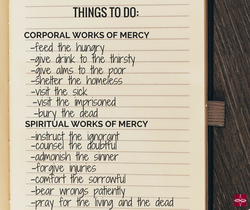 “The Corporal Works of Mercy are found in the teachings of Jesus and give us a model for how we should treat all others, as if they were Christ in disguise.” -United States Conference of Catholic Bishops (USCCB) The above description of the Corporal Works of Mercy reminds us that Christ lives within all of creation, unifying every living being. When we experience this sacred reality, we come to understand our actions as a means by which we may bring healing and wholeness to the Body of Christ. As our Bon Secours Ministry Volunteers practice the Corporal Works of Mercy through their service, they develop a deeper appreciation for the web of relationships which connects each of them in both an intimate and a personal way to all those they meet in their daily lives. In the reflections below, the BSVM volunteers share encounters which illustrate this growth. It is in the act of responding to their neighbor’s hunger and thirst for dignity through the Corporal Works of Mercy that our volunteers meet Christ in service. - Olivia Steback, Program Manager, Bon Secours Volunteer Ministry Feed the Hungry and Give Drink to the Thirsty By Gerard Ondrey When I bring a patient a container of apple juice or a pack of graham crackers, it often doesn’t register in my mind as a significant action. After all, most patients get three meals a day while in the hospital, something many of them do not receive outside the care of Bon Secours Baltimore Hospital. However, during my year of service I have come to realize the importance of these gestures lies not in their magnitude, but in the greater recognition of the human dignity these acts symbolize. The patients I encounter, many of whom struggle with poverty, homelessness, drug addiction, and other afflictions which contribute to their marginalization from mainstream society, are not used to being waited on or served. On the other hand, I am accustomed to going out to restaurants with family or friends, people taking my order, cooking my food, filling up my drink glass, and removing my dishes when I am done. When offering a patient a snack, I don’t quite have the selection of a five-star restaurant to choose from, but when I am asking a question as simple as, “Would you prefer apple, cranberry, or orange juice?” I feel I am embodying the ways in which I have been served. “Waiting” on patients, taking their “orders”, bringing them food, and clearing things away when they are done, feel like true acts of mercy. I am showing them that I find them important by honoring their requests and responding in a full and prompt manner. In my mind, this is what it means to live out the Corporal Works of Mercy of feeding the hungry and giving drink to the thirsty. In the above scenarios, the acts are not important because the people I am serving are in danger of starving to death in that moment, but because of the dynamic they represent; seeing and honoring Christ’s presence in all people elicits the desire to serve. Shelter the Homeless By Alex Yeo Through my ministry in the emergency room I have been able to work with many of the homeless men and women who reside in our community. These individuals come to the hospital seeking medical care and assistance with their social problems. My role, when I first meet them, is to ensure that their non-medical needs are addressed. One of the main organizations the hospital partners with is Healthcare for the Homeless, a nonprofit that provides medical care and social service assistance. With their aid, I have been able to provide patients the support and resources needed to help them transition out of homelessness. Visit the Sick By Mackenzie Buss Our volunteer community has been fortunate enough to avoid sickness so far (thank you Lord!) but, every day at the hospital, we work with those from the greater West Baltimore community who are ill. In my experience, it is often the sickest patients who are the most difficult to 'be present to'. All of our renal patients have a lot going on in their lives, from physical ailments, comorbidities, and actual disability to the myriad social problems that living in an impoverished neighborhood presents. In spite of the massive obstacles that all our patients face, there is still a huge range in energy levels and general overall health. The chipper, friendly, energetic patients are often the easiest to build relationships with. At first, I was daunted by the prospect of talking to the older, quieter, sicker renal patients. As I have grown and learned with Bon Secours Volunteer Ministry this year, I have come to understand that our service isn't necessarily about entertaining patients, solving little problems, or even listening to them. It's about being there for them with your whole soul. That is the mentality that empowered me to smile a bit and sit down next to one of our elderly, quiet, very sick nursing home patients. Sometimes, I'll hold her hand or say something that I am thinking of, but mostly I just sit there beside her. It's really a silent visit, a moment of being present to one of my sisters in Christ in the only way I know how - to just be together. I don't have much else to offer her, but something about those tiny moments, no matter how small and simple, just feels right. It's like a little slice of the Holy Spirit is there in right relationship with us as we sit and simply be together. Visit Prisoners By Elizabeth Modde It is not unusual to pass a man or woman walking down the hallway in handcuffs, flanked by two security guards. Bon Secours Hospital in Baltimore ministers to patients from the Department of Corrections. In fact, some patients admitted to St. Martin's Hall Inpatient Unit will be discharged to the police. Seeing these patients, shackled to their beds, I find myself trying to imagine what they must be feeling. Some are visibly anxious. With a small idea of the dehumanization that can be experienced in prison, I feel privileged to extend warmth and kindness to our prisoners at the hospital. Recognizing basic humanity and dignity, of both patients and the guards in their rooms, can be as simple as smiling and offering a cup of water. Bury the Dead By Alex Yeo In the ER, you rarely get the opportunity to develop a lasting relationship with a patient. There is a very specific process: triage, treat, and either discharge or admit to the inpatient floor. The focus is on efficiency not casual conversation. Regardless, many of the patients that come to the ER frequently are often too intoxicated or incapacitated to engage in conversation. This year, however, I had the privilege of meeting a patient, let us call him David, who had developed a lasting relationship with the ER staff. David, admittedly, was not the most pleasant patient to work with; a homeless alcoholic he had been cycling through the ER for over twenty years. I was always impressed that despite how frustrating it was for the staff to see him constantly return to the hospital, they were able to retain hope for his future. He was always given a place to rest out of the cold, a warm meal, and often times new clothes. The ER staff was his family. Their relationship may have begun begrudgingly but was now one of love and concern. When David passed away this winter, the mood in the ER was one of sadness and relief. Knowing that he had moved on to a better place brought solace to those who had worked with him. Being one of the last people to work with him, I was given the task of organizing his memorial service. Visiting the different departments of the hospital to raise publicity about the service, I was amazed at how many people in the hospital knew of him or had stories about caring for him. The hospital staff had given him many resources and much love, but he also gave back to us. During those difficult and frustrating moments of caring for him, he taught us how to love and to be patient; how to look past one’s impulsive judgments and tap into a deeper desire to care for one another as members of God’s creation. For those lessons we are eternally grateful and his presence will be greatly missed. Give Alms to the Poor By Nicole Odlum Through my ministry, I had the privilege to deliver Christmas gift bags to the many seniors I visit every month for blood pressure screenings. Around Christmastime each year, women from local Baltimore churches donate gift bags filled with simple personal hygiene products, laundry and dish detergent, and hand-knit scarves. For many of the residents, this may be the only Christmas present they receive. When I told them they could keep the entire bag of gifts, the look on their faces was humbling. The gratitude and appreciation they expressed was inspiring; this simple, unexpected gift bag brought them so much joy. One woman actually came back down from her apartment after leaving with her gift bag to thank us again for the things we gave her. That was an extremely powerful moment for me, because I realized how much these simple items, items most people consider a necessity, meant to the seniors. Pope Francis writes that, “Mercy is the force that reawakens us to new life and instills in us the courage to look to the future with hope.” Please continue to remember our volunteers in your prayers as they take Pope Francis’ words to heart and strive to courageously live lives of mercy and hope. To learn more about the Corporal and Spiritual Works of Mercy, click here. This post was originally written and posted on the Catholic Volunteer Network Blog. For more Catholic Volunteer Blog Posts please visit the CVN Blog Page. The Catholic Apostolate Center is proud to partner with the Catholic Volunteer Network by developing faith formation resources for volunteers and alumni, assisting in its efforts to provide and advocate for faith-based volunteerism and collaborate in many additional ways. “Are you junior Knights of Columbus?” This was the question posed to me by an elderly woman during my freshman year of college as I joined my brother knights for 8am Mass at the Basilica of the National Shrine of the Immaculate Conception adjacent to The Catholic University of America’s (CUA) campus. It was a Friday morning, and of course I loathed getting out of bed. However, I had made a commitment and I wanted to follow through as best I could.
Some of the upperclassmen knights that were with me answered politely back, “No, ma’am, we’re just regular knights.” She smiled and wished us well, clearly happy to see young men going to Church. Back then, our council membership was small, but we had big aspirations. All of the guys that I joined the Knights with had the same idea in mind. Here we were, embarking on a new chapter of our life. We wanted our faith to be enriched and strengthened. We wanted to serve the community and neediest among us. We wanted to find friends who would support us in our endeavors. The Knights of Columbus are a 1.9 million member Catholic fraternal organization. Founded in 1882 by the Venerable Servant of God Fr. Michael J. McGivney, the order is founded on the principles of charity, unity, fraternity, and patriotism. Originally formed to provide financial assistance to members and their families, the order today continues to do so through its insurance program, which funds its charitable works. The Knights of Columbus are organized into local councils, often housed within parishes, and are governed internationally by a supreme council headquartered in New Haven, Connecticut – where the order was founded. As the Knights of Columbus meet this week in Toronto, Canada for their Supreme Convention – their international convention during which they elect officers, pass resolutions, and report on membership, etc.—I wanted to share my story of the impact this organization has had on my life. Growing up, I always wanted to get involved in extracurricular activities at school and within my community. I joined the student council, led clubs, and served as a counselor to other students. When I arrived at college, things were no different. The CUA council of the Knights of Columbus was the first group I joined. It soon became apparent to me that I had found just what I needed – what I had been looking for as a new college student. This group would help me realize that my faith should not just be important - but it should be the cornerstone of my being. As a knight, I have grown in fraternity with my brothers. I have been able to serve my community through charitable fundraisers and service opportunities. I have supported veterans and active-duty military – something that the order encourages no matter which country a council is in. I have been able to instill in others the characteristics of true chivalry. Because of the Knights of Columbus, I have become a better Catholic and a better man. I would encourage any Catholic male to think about joining this organization. A similar organization for women is the The Catholic Daughters of the Americas. If you are already a knight, I would encourage you to stay involved and help to recruit others. As our chaplain is fond of saying, “What you give to the council, you will get back one hundredfold.” I cannot endorse this statement enough. Let me leave you with a few lines from a song that we sing at the end of our council meetings: We have a mission great True to our Church and State Onward we move We dry the mourner's tear The tired heart we cheer Faith in our works appear, Upheld by Love. These few lines, I think, embody just what it means to be a Knight of Columbus. “Love is…the fundamental and innate vocation of every human being.” (John Paul II, Familiaris Consortio, 11). Mankind was created in the image and likeness of God in order to love and to be loved. This divine vocation is made possible by the Father’s love for us: we love because we were first loved (cf. 1 Jn 4:10). In October of 2014 and 2015, bishops from around the world met at the request of Pope Francis to discuss human love, specifically in the context of marriage and family. The themes touched upon included "the pastoral challenges of the family in the context of evangelization" as well as "the vocation and mission of the family in the Church and in the contemporary world." After two years of discussion, reflection, prayer, and deliberation, the Holy Father compiled the ideas gathered from the synods into a post-synodal Apostolic Exhortation, Amoris Laetitia. Using both poetic and approachable prose, Pope Francis shared with the Church his insight into the joy and dignity of human love—writing on topics such as the Church’s teaching on marriage and family, the education of children, and pastoral strategies for marriage preparation. On July 12th, Center Director Fr. Frank Donio, S.A.C. used the wisdom found in Amoris Laetitia to present on its pastoral implications for marriage preparation using Facebook Live. You can view his presentation here. Below are nine quotes and lessons from this historic document that are especially pertinent to couples preparing for marriage and those preparing couples for marriage. I invite you to spend some time reading these quotes, reflecting on them, and implementing the truths they contain into your understanding of marriage and marriage preparation. 1. Marriage Preparation begins at birth Marriage preparation begins from birth – we are born into families, grow up in the context of family, and are surrounded by families throughout our lives. For this reason, Pope Francis says that “Learning to love someone does not happen automatically.” It is a lifelong process which we must choose to grow in each day. 2. Quality of content over quantity. As couples gather together to prepare for marriage, Pope Francis recommends that we do not overwhelm them with every single resource from the Catholic Church. Since the time of marriage preparation is usually brief, the Holy Father recommends sharing quality information—such as the fundamental aspects of marriage, church teaching, and a basic understanding of the kerygma, or story of salvation. Marriage preparation should be comprehensive, but it cannot be exhaustive or total. Be prudent and intentional about the quality and quantity of information you are sharing. 3. Highlight prayer as an essential part of marriage. Prayer is fundamental not only to the Christian life, but to any vocation. For the lifelong commitment of marriage to succeed, it must be rooted in the daily prayer of husband and wife. This prayer has two dimensions: personal and communal. Personal time of prayer and reflection ensures that each spouse is growing in their relationship with Christ, while prayer as a couple unifies the spouses, improves their communication with one another, and grounds their relationship in Christ. When both personal and communal prayer are alive within a marriage, the relationship of husband and wife is being revitalized and strengthened in such a way that can reflect the love of the Trinity and pour out into society as a whole. 4. Marriage is a life-long commitment. Sacraments and major life events should be celebrated in a way outside of our ordinary day-to-day life. Marriage is no different. We are, in fact, celebrating something beautiful and life-changing. However, we should not let ourselves be carried away by the details of planning the “perfect wedding day.” Pope Francis advises couples not to get too invested in the consumption of material goods or the planning of the wedding day itself, inviting them instead to focus on rooting their relationship in Christ, the sacraments, and prayer. 5. Marriage is more than the wedding ceremony. Marriage preparation encompasses much more than a formal program, retreat, class, or a weekend geared to meet a checklist for the church. Formal marriage preparation should help couples discover the dignity of the married vocation and set their sights on the life they will make together as “one.” The ceremony is not “the end of the road,” as Pope Francis states, but a necessary part of the sacrament. We are called to help couples see the wedding ceremony as a launchpad moving them forward in their life-long calling. We are furthermore called to give couples the tools and strategies for successfully working through trials and difficult moments together. 6. Marriage is “total.” The Catholic Church affirms marriage as an indissoluble union grounded in fidelity, fruitfulness, freedom, and totality. Marriage is not simply a convenient relationship, a partnership with someone who makes you happy, or a public display of love—though it can comprise all of those things. The Church understands that marriage is a sacrament administered by man and wife, witnessed by the Church community, and blessed by God. It is a serious but heroic, joyful, and sanctifying undertaking “until death do us part.” 7. Give couples the tools they need to detect danger signals in their relationships and respond constructively. Preparation for marriage should be filled with joy. However, it is still a time of preparation. Each relationship will have moments of unity and conflict. A couple may agree on issues like raising children or budgeting, while disagreeing on how to spend free time or how to best communicate. It is important for each couple to be aware of any sources of woundedness or conflict in their relationship before the wedding day in order to work on constructive practices for moving forward. 8. Explain the significance behind the liturgical celebration and the meaning of each of its signs. While we are not called to get “wrapped up” in the wedding day, we are called to dispose ourselves to the profound significance of the liturgical celebration of marriage. Marriage is a sacrament. To enter into this sacrament is of vast significance. For this reason, it is important to learn more about and understand the meaning behind the signs used in the liturgical celebration – the rings, the white dress, the vows, etc. Let us help couples preparing for marriage enter into the wonder of the sacrament through the richness of the liturgical celebrations of the church. 9. Help couples preparing for marriage discover or rediscover the dignity and beauty of marriage. It’s tempting to be disheartened by the lack of successful marriages we see in the world around us. Marriages can be overwhelmingly broken, destructive, or lifeless. This is not part of God’s original plan for marriage, and Pope Francis wants to encourage engaged couples to discover or rediscover the dignity and beauty of marriage as a liberating, sanctifying, unconditional relationship in which each spouse is loved and affirmed. How can you support married couples or those planning on getting married? How can you change the marriage narrative to better reflect God’s plan? For more resources on Marriage and Family, please click here.
|
Details
Archives
July 2024
Categories
All
|
About |
Media |
© COPYRIGHT 2024 | ALL RIGHTS RESERVED

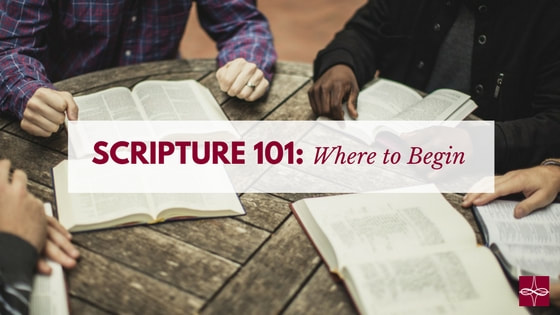
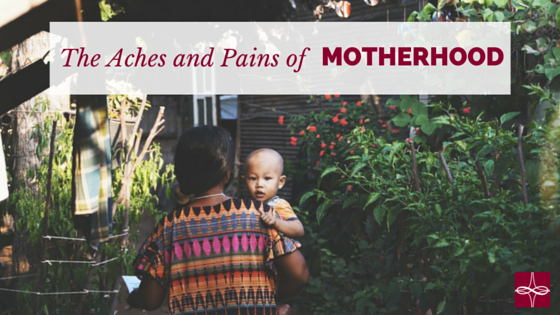

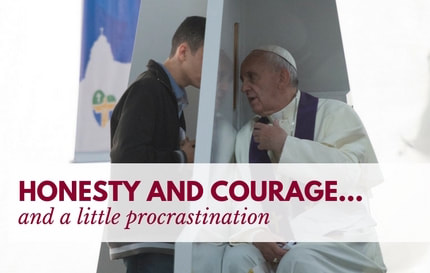

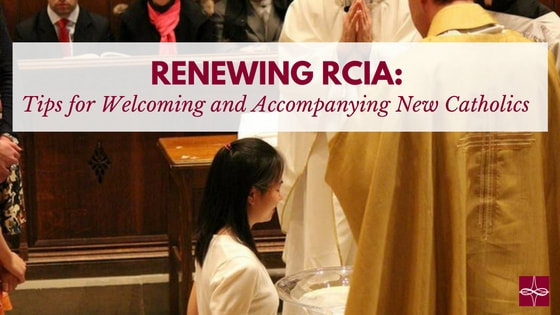

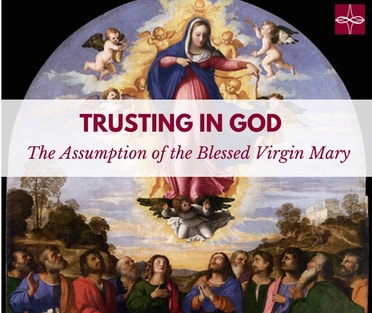

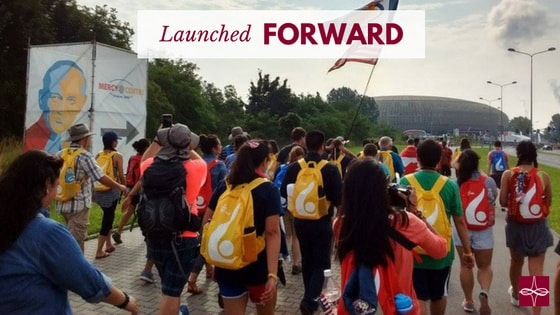

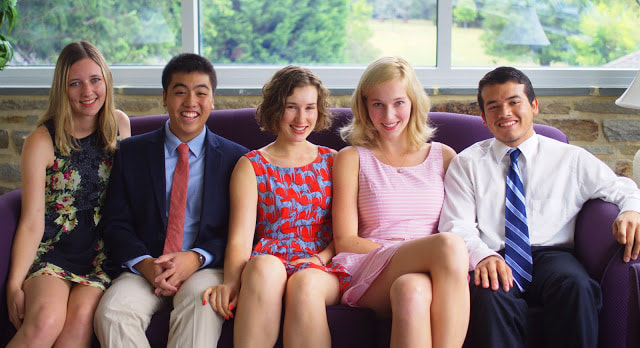
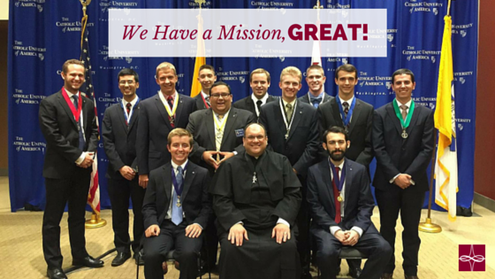

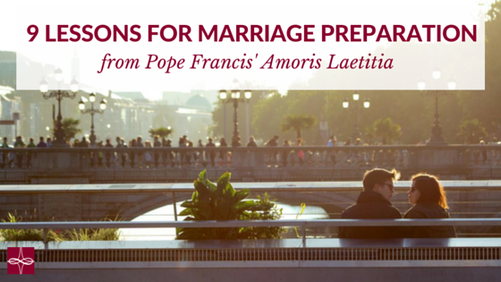

 RSS Feed
RSS Feed